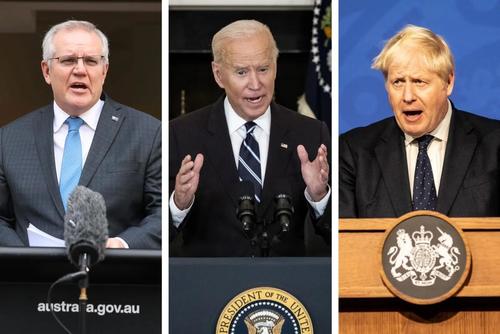Source: Zero Hedge
Following Wednesday night’s major announcement by President Joe Biden, Australian Prime Minister Scott Morrison and UK Prime Minister Boris Johnson unveiling a new strategic security partnership among the three countries focused on defense technology sharing, particularly which will allow Australia to develop nuclear submarines, China was quick to blast the pact as an assault on regional peace and stability which will unleash a dangerous new “arms race”.
China wasn’t specifically invoked in any of the leaders’ remarks, but the pact known as AUKUS, (an acronym for Australia, United Kingdom and the US) is being widely interpreted as part of Washington efforts to thwart China and its influence in the Indo-Pacific region. Beijing certainly sees it this way, given on Thursday Chinese Foreign Ministry spokesman Zhao Lijian condemned the partnership as it “greatly undermines regional peace and stability, aggravates the arms race and hurts the international non-proliferation efforts.”
Further questioning past Australian statements on nuclear nonproliferation and its longtime commitment to not acquire any nuclear arms, the foreign ministry spokesman charged the US and UK with “using nuclear exports as geopolitical gaming tool and applying double standards.” He also echoed prior accusations that the US is fueling an “arms race” amid heightened tensions in the Asian-Pacific region.
In addition to nuclear-power submarine development, other key sharing areas are to include artificial intelligence, cyber, underwater systems and long-range strike capabilities. Again this is being widely interpreted as a move to keep regional US ally Australia from falling significantly behind China’s huge recent leaps in military technology, which has included hypersonic missile development of late.
One Biden administration official told reporters at a briefing on Wednesday: “This partnership is not aimed, or about any one country, it’s about advancing our strategic interests, upholding the international rules based order and promoting peace and stability in the Indo-Pacific.” The official added: “This is about a larger effort to sustain the fabric of engagement and deterrence in the Indo-Pacific.” This is as close as the administration has come to offering a ‘counter-China’ rationale behind the pact.
But Chinese state media is also alongside officials in Beijing interpreting the AUKUS as aimed precisely at China and its security interests in the region, which has included expansive claims in the East and South China Seas.
Australia is making big strides in the direction of being an enemy of China. Congratulations Australia, you are becoming an “anti-China superpower”. pic.twitter.com/tkcV7LL2Ci
— Hu Xijin 胡锡进 (@HuXijin_GT) September 16, 2021
The outspoken editor of the Communist Party mouthpiece publication Global Times Hu Xijin bluntly stated that Australia is fast moving in the direction of becoming an official “enemy of China”…
Congratulations Australia, you are becoming an “anti-China superpower,” the state media pundit said.
Meanwhile, the deal will eventually allow Australia to become one of the very few countries in the world to operate nuclear submarines. One a former Australian intelligence officer who is now a defense analyst at Australian National University told Bloomberg, “This is the biggest surprise in Australian geopolitics in decades.”
The security analyst John Blaxland, said additionally that “The subs deal shows the US now sees the utility of bolstering Australia’s capabilities to complement its own in a way it never did before.”
Likely not wishing to join Australia in coming to within Beijing’s crosshairs over the provocative and controversial deal, New Zealand has reiterated its longtime police of banning nuclear-powered vessels from its waters.
France is also not happy with the deal among the trio of countries, saying it’s been “stabbed in the back”…
France accused U.S. President Joe Biden of stabbing it in the back and acting like his predecessor Donald Trump after Paris was pushed aside from one of the world’s most lucrative defense deals that it had signed with Australia for submarines https://t.co/iA6IshUL8i pic.twitter.com/kxupgMxtuq
— Reuters (@Reuters) September 16, 2021
“Certainly they couldn’t come into our internal waters. No vessels that are partially or fully powered by nuclear energy is able to enter our internal borders,” New Zealand Prime Minister Jacinda Ardern said Thursday in reference to the country’s 1984 “nuclear-free zone policy”.


